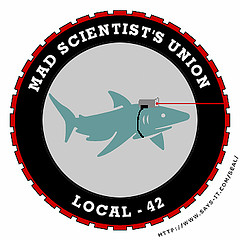October 27, 2009
Selling shovels to News diggers
 I had a fun idea tonight (patent pending) that occurred to me after reading about the Newspaper’s accelerating collapse, the Talking Point Memo’s membership experiment, and the recent report on reconstructing journalism.
I had a fun idea tonight (patent pending) that occurred to me after reading about the Newspaper’s accelerating collapse, the Talking Point Memo’s membership experiment, and the recent report on reconstructing journalism.
I can’t recall ever reading about or debating my new journalistic business model, and I’m not sure if its crazy, brilliant, or evil.
Has anyone ever thought about charging newsreaders to express themselves?
Micropayments for comments, not content?
Seriously, how wild would that be. Pay to comment. Maybe pay to vote, rate, like/dislike. You could even sell different priced foods for people to throw at the journalists (and at other users), provoking foodfights in the newsroom. People would pay to mad men themselves, if you allow them to customize their avatars so they could rant in style.
Now, I recognize it might sound like a step backwards, or slightly anti-democratic, but not long ago there was no commenting at all. And folks can pick themselves up and have a conversation anywhere on the Internet if they want to. But, you are offering the readers the spotlight of attention… kinda like, advertising! The dating sites have finely tuned the market dynamics of charging users to communicate. Would these comment stamps reduce or increase the spam?
Maybe the scales are all wrong – it’s probably something like 1% of readers that ever participate, but if fashion (and flickr and Second Life) is any indication, people dispose plenty of their income expressing themselves in public.
So, Mr. Murdoch, tear down this firewall. Everyone knows the real money comes from the souvenir and concession stands. It’s better than free.
 Filed by jonah at 12:35 am under aesthetics,fourthestate,freeculture,water
Filed by jonah at 12:35 am under aesthetics,fourthestate,freeculture,water
 9 Comments
9 Comments



